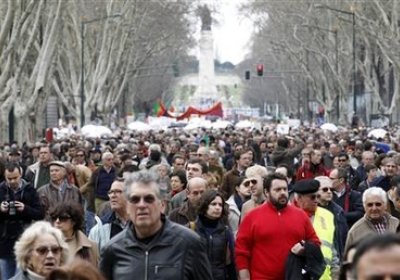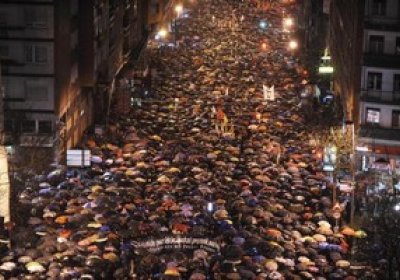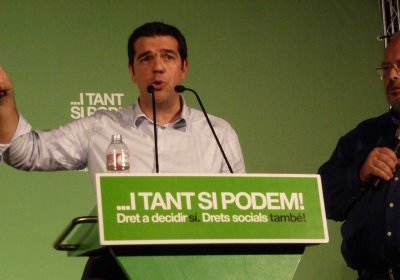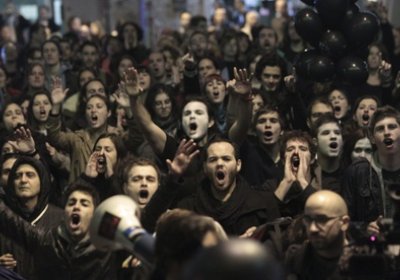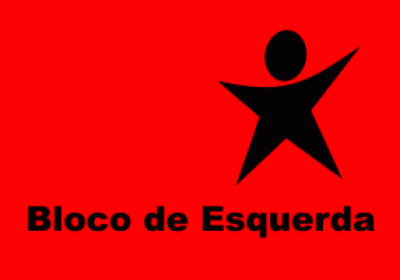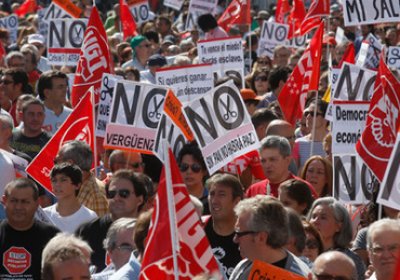Whenever there is a protest in Portugal you are almost certain to hear the haunting song “Grandola, Vila Morena” (“Grandola, sunburnt town”), with its line “who most rules within you, O city, is the people”. On March 2, at huge protests across Portugal, “Grandola, Vila Morena” was sung by more voices than ever before.
Dick Nichols
Nearly 10 years after the Spanish high court outlawed previous Basque left nationalist political groups, the movement has finally given birth to a new legal party ― Sortu (“to create” or “to be born” in Basque).
The new arrival is a powerful force for Basque independence and progressive politics in the Spanish state ― socialist, feminist, ecologically aware and staunchly internationalist.
Jesus Posada, the right-wing People’s Party (PP) speaker of the national Spanish Congress of Deputies, received a delegation on February 12 presenting a People’s Legislative Initiative (ILP). The initiative had the support of more than 1.4 million signatories, 900,000 more than required by law.
Political tensions within the Spanish state have reached a new pitch after the January 23 declaration by the Catalan parliament of Catalonia’s sovereign right to decide its political future.
Antagonism is intensifying between the Catalan and national governments and polarisation continues to rise among and within all main political forces.
The latest economic data for the European Union, released on December 6, confirms that the region has officially entered a “double-dip” recession. Over the year to September, Gross Domestic Product fell by 0.4% in the 27-state European Union (EU27) and by 0.6% in the 17-state eurozone.
On the same day, the European Central Bank revised its September forecast of 0.5% growth in the eurozone in 2013 down to -0.3%.
Politics in the Spanish state is a Rubik’s cube where all players must mark out their position on the axis of the rights of its nationalities, as well as class struggle and social justice.
All-out warfare on both fronts marked the final week of the campaign for the November 25 elections for the Catalan parliament, as the nine parties with a chance of winning representation in its 135-seat chamber traded blows.
The European Day of Action and Solidarity involved a 24-hour general strike in Portugal and Spain, partial strikes in Italy, Greece, Belgium, Cyprus and Malta, and protests in 16 other European countries on November 14.
Despite the main action being confined to the Iberian peninsula, the day was a big success, with 40 union confederations and individual unions involved.
A spectre is haunting Portugal ― the spectre of Greece and of SYRIZA, its radical-left party. All the powers of neoliberal Europe, led by German Chancellor Angela Merkel, have entered into an unholy alliance to exorcise this spectre.
Accompanied by representatives of German big business, Merkel ran the gauntlet of protesters in Lisbon for six hours on November 12. She congratulated Portuguese Prime Minister Pedro Passos Coelho for his “courage” in applying austerity (a “success story”) and urged the country’s most unpopular political leader to stick to his guns.
On the morning of October 22, the day after parliamentary elections in the Basque and Galician autonomous communities of the Spanish state, the TV and radio political pundits were struggling to be wise.
Their powers of analysis were not tested so much by the rise of EH Bildu, the Basque left-nationalist coalition — the polls had predicted its 25% vote. The disorienting new phenomenon was result for the Galician Left Alternative (AGE).
Not predicted
The economic, social and territorial crisis facing the Spanish state is morphing into a crisis of the two-party system that has provided either Popular Party (PP) or Spanish Socialist Workers Party (PSOE) governments for 30 years.
Those who have been gaining electorally are Basque, Catalan and Galician nationalist forces (left and right), and the United Left (IU) and Union, Progress and Democracy (UpyD).
The results of October 21 election for the parliament of Euskadi, the Basque autonomous community within the Spanish state, are expected to confirm the rising popularity of the left nationalist coalition, Euskal Herria Bildu (EH Bildu―Basque Country Assembly).
Regardless of whether EH Bildu tops the vote or is pipped by the conservative Basque Nationalist Party (PNV), progressive politics in Euskadi seems certain to record its best ever result.
Two recent events dramatised the state of economy and politics in the Spanish state: the Red Cross announced that this year the takings of its annual Flag Day would go to fight poverty and social exclusion in Spain, and education minister Jose Ignacio Wert told the national parliament that changes to the national education syllabus were aimed at “Spanishing” students in Catalonia.
The Red Cross decision came as a shock across the country. People knew things were bad, but that bad?
- Previous page
- Page 19
- Next page
